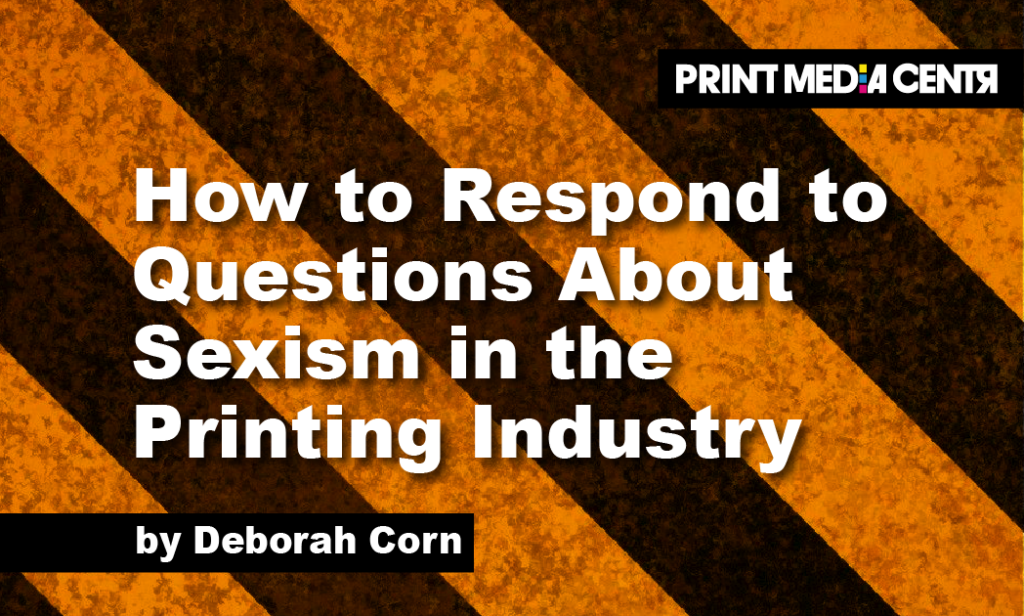
With just a few minutes before the first, women-only panel discussion on the main stage of Dscoop ended, the audience at Edge St. Louis was asked if they had any questions. The mic goes out to the audience, a gentleman stands up. With what I interpreted as a mixture of nerves, uncertainty, and a splash of bravery he asked, “Is there sexism in the printing industry?”
The room went silent.
Up until that moment, the panel had been laser-focused on strategies to drive innovation and growth, the importance of company culture and aligning with suppliers who support and reflect their company values, workforce challenges, and sustainability.
In other words, this was a business discussion.
The panel was led by two female Dscoop Board members. There were three female panelists with major titles from consumer brands you know. Had any of the participants been male, I can’t see how much would have changed regarding the questions, and how the panelists responded about their work and responsibilities.
The panelists indicated through facial expressions and uncomfortable body language that they would be passing on answering that question. That is the correct position in a public forum when panelists are not there to discuss isms of any kind or have the legal authority to speak for a company on such things.
They could have responded from a personal point of view based on their overall professional experience; however, that is a risky move with unknown consequences. Imagine someone in the audience taking a photo of the panelist and sharing it on social media with the caption “Panelist (name) from Brand X says she experiences sexism in the industry.”
The moderators took a different approach. They responded.
They both shared how THEY do not believe there is sexism in the printing industry based on THEIR experience and the men who have mentored and helped them along the way.
That response created some head-shaking in all directions.
Some heads were moving up and down in the affirmative as in “See, I knew it. Nothing is going on.” Some heads were moving side to side in disagreement as in “That is not my experience and/or the experience of women in a male-dominated industry and/or the world.”
One more question was asked by an audience member, and then the closing session ended at Edge St. Louis. I gathered my wits and belongings and headed for the door.
Along the way, I spoke to several female attendees, exhibitors, and students who were visibly upset and confused by the response to the sexism question. A few gentlemen also chimed in, all of whom skewed Millennial. They were looking to me as Girl #1 at Girls Who Print to help them make sense of what had just transpired.
At the time I kept it simple. Panelists can’t speak for brands, and the moderators spoke of their personal experiences. Regardless of how unbelievable it is that in all their years working in a male-dominated industry, they have NEVER experienced any sexism, that is how they chose to respond from the main stage at an industry conference, without any preparation.
I took a slow walk back to my hotel, alone. I gave the question and response a lot of thought. I also had conversations in the airport on this topic with several attendees – male and female. That gave me some more insight and information to consider, an important perspective.
I let Dscoop know I was writing this follow-up post because I was at Edge St. Louis working with the event team. My thoughts below are not specific to Dscoop or Edge St. Louis. The question asked during the session opened the door for a bigger conversation.
How to Respond to Questions About Sexism in the Printing Industry
First a preamble…
There is sexism in the printing industry. There is sexism in most industries, and if you are a woman more than likely you experience it in some manner every day – whether to your face, behind your back, in your compensation, and/or opportunities available to you along your career path.
Women who experience sexism make a professional choice to pursue the matter by reporting it. That can often open a new door of hell as women can – and often are – penalized socially and/or professionally for speaking up.
Stating “it doesn’t happen at my company” because you haven’t seen it or received any complaints isn’t the best measurement of the situation.
Any event that includes a ‘Women in Leadership’ session needs to understand that the male-dominated audience may have thoughts on that, and they might not be as receptive to the concept as you hope. I have heard so many times from male attendees that events are just ticking a DEI box by having women-driven sessions. How it’s part of an ‘agenda’ and they don’t want to be subjected to it. —- Case in point, the closing Dscoop session had about 1/3 of the total Dscoop audience in attendance, if that much, despite the firepower on the stage and the informative and insightful discussion that took place.
Just because there are women on the stage for an all-women session doesn’t mean the audience is clear on why they are up there. There is a giant chasm between a session led by women in the industry and sessions for or about the experience of women in the industry. Clarity keeps impromptu audience questions in their proper lanes.
When programming is created to feature women in the industry discussing their experiences, events need to seek out speakers who are unapologetic and forthright and have no fear of facing repercussions for their participation. Otherwise, thoughts of box-ticking motivation behind the session transform into attendee chatter, and the women who participate get lumped into it in a negative way.
Now back to the specific question at hand…
The lights slightly brighten in the room for Q&A after an epic panel discussion. A mic is handed to a male attendee who raised their hand, and I am asked … “Deborah, is there sexism in the printing industry?”
And I say, after taking a deep breath…
Sir, I am curious. How many people in the last 10 years have asked you if there is asbestos in your building?
With a very confused look, he responds, “None.”
I continue…
That is because we collectively agreed that asbestos was bad, and we did something to remove it and protect all workers in their workplaces.
If we look at sexism like asbestos, I ask you and the business owners and managers in the room – what have you done to ensure all your workers are protected in your workplace?
If the question “Is there sexism in the printing industry?” needs to be asked, with all due respect, in my opinion, it’s rhetorical.
So, let’s go to the next level, and begin the removal process.
Start by talking to some women who work outside of your company and the printing industry – friends, neighbors, and family members. Ask them if they have ever experienced sexism in the workplace, how it manifested, what (if anything) they did about it, and what (if anything) happened to the offender or offenders.
Listen, learn, and do all you can to create a sexism-free zone within your walls.
Work with HR and legal professionals to establish equitable company policies for all, and make it clear there is zero tolerance for any breaches.
Lead by example. In all ways.
Share your journey and success with your peers, with your groups, and with organizations by speaking at events and telling your story.
Be the butterfly that creates a tsunami of change for women in the workplace. It all starts with you!
Manners Maketh the Man
I’ve watched both Kingsmen movies too many times to count. That is the reference for the phrase if you haven’t. Apply it by treating your female owners, employees, managers, colleagues, and peers with respect on every level, and in every situation. Don’t allow others to be inappropriate in your presence.
Show your support by sponsoring Girls Who Print and our endeavors. We have been at this for 14 years, have a LinkedIn Group with almost 10,000 professional women and students, manage an active mentoring program, produce podcasts and online events including our annual Girls Who Print Day Conference… have a chapter in West Africa and more countries are coming.
There is NO COST for women to join Girls Who Print, participate in our mentorship program or attend our events. I use the sponsorship money to cover everything. It’s only $1500 to help us, and there are add on’s after that. Info here.
We also partner with professional coaches to bring affordable workshops to women in the industry. Leadership Skills for Every Girl Who Prints: THE Playbook for Being Bold is coming up on June 1st and 2nd from 1-2 PM ET each day. It’s only $60 for both sessions and students can attend for $30 by registering with coupon code GWPSTUDENT – thanks to the support of our sponsors!
Appreciate you reading this post until the end.
Thanks in advance for doing something positive to make the workplace (and the world) a better experience for everyone.
EMPOWER LONG AND PROSPER!
##
See Deborah’s featured post: The Perfect Partnership: Collaboration Between Printers and Designers

Deborah Corn is the Intergalactic Ambassador to the Printerverse at Print Media Centr, a Print Buyerologist, international industry speaker and blogger, and the cultivator of Print Production Professionals, the #1 print group on LinkedIn. She provides printspiration and resources to print and marketing professionals through education, events, Podcasts From The Printerverse, ProjectPeacock.TV, and an array of community-lifting initiatives including Girls Who Print, Elevate Print, #PrintChat, #PrintLife and International Print Day.
Deborah also helps companies create more meaningful and profitable customer relationships by utilizing more than 25 years of experience as an agency, brand, and corporate print buyer who has assessed, hired and worked with a plethora of printers and service providers.
Explore Podcasts From The Printerverse
ProjectPeacock.TV is streaming PRINTSPIRATION to brands, agencies, students, and printers!
Connect with Deborah: Twitter / Facebook / LinkedIn / Instagram / YouTube / Pinterest / Print Production Professionals Group / [email protected]
Please subscribe to PMC’s News from The Printerverse for topical posts and information delivered to your inbox.
Calling all Girls Who Print!! Join us on LinkedIn and check out our revamped Mentoring Program – it’s free!


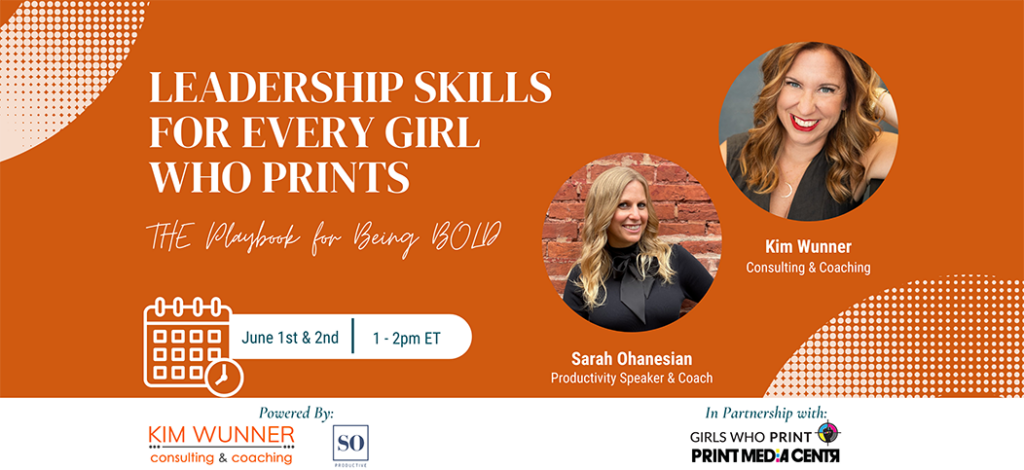






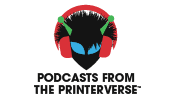

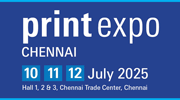
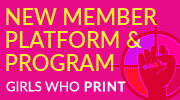


2 Responses
very interesting and well-written article. Of course I’d like to know who the gentleman was!
Excellent commentary and analysis from Deborah Corn. College and university educators have classrooms with 80% students who identify as female – they are professional, focused, and motivated. We need to continue to have role models that our students can relate to. Sadly too many conference and technical meetings have panels consisting solely of middle-age men – and many organizations do not even see this as a problem! Having women panelists is a great start, but we are not there yet, and Deborah’s observations are relevant and pertinent.